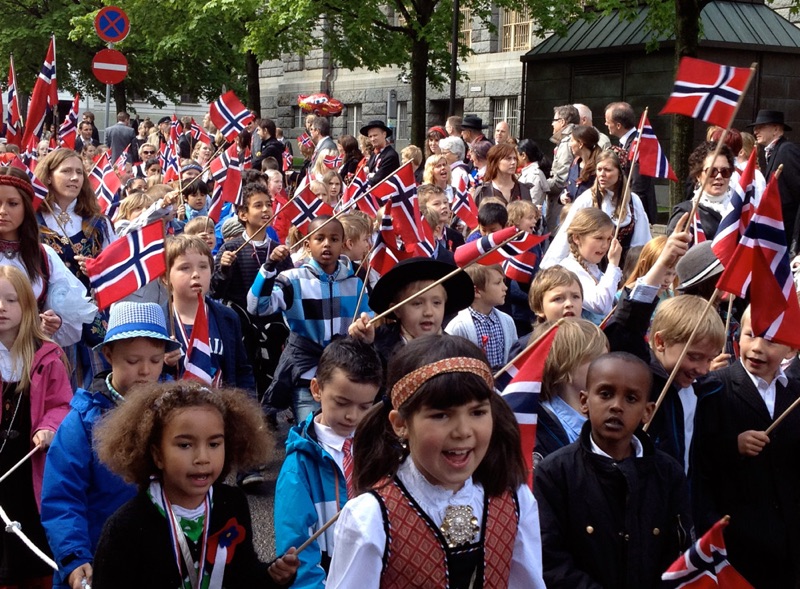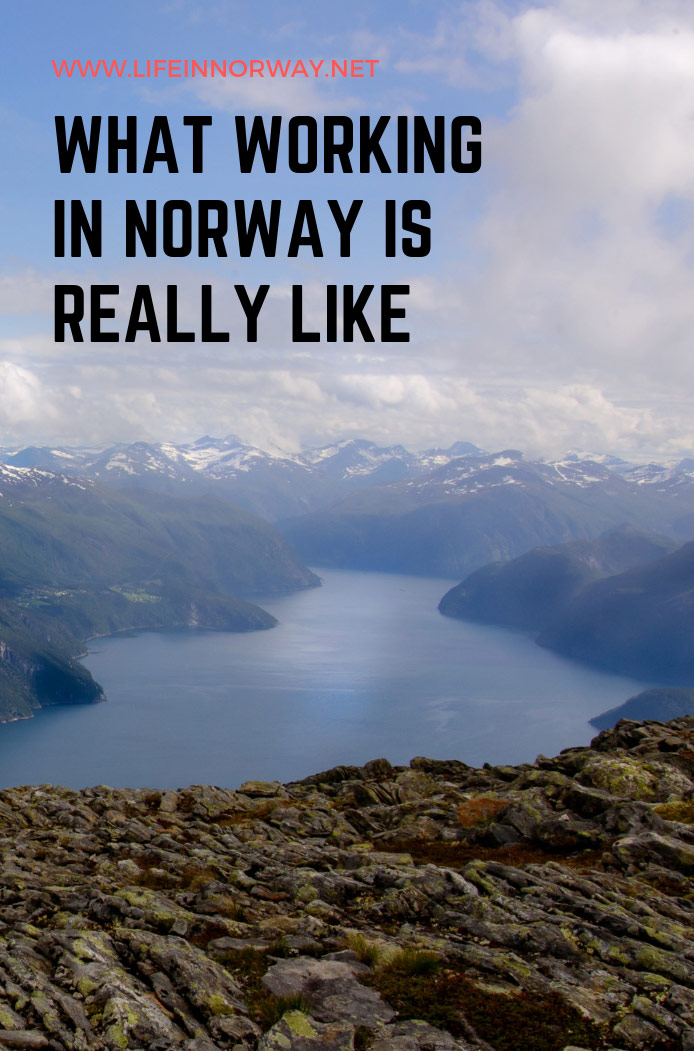Just how different is the day-to-day experience in a Norwegian workplace? An American gives us his experience.
This week, I have continued to search for jobs, attend Norwegian language classes, work with recruiters, and attend networking events and conferences here in Trondheim in an effort to make myself a better candidate for job opportunities.

I have learned very quickly that Norway has one of the most competitive and technical job markets in the world.
More than just oil
Norway is known for being an oil-wealthy nation and rightly so but that does not mean that Norway relies only on its oil exports as the main source of revenue.
On the contrary, Norway (and Trondheim in particular) is one of the most technologically advanced and innovative societies in the world.
Far from the days of fish and seafood, potatoes, and a strong reliance on agriculture, Norway is now a world leader in many technological sectors.
In fact, Norway was ranked the #1 most prosperous country in the world for the sixth year in a row in 2014, according to the Legatum Institute’s Prosperity Index.
Priority of education
In the US, education is highly valued and the name of your university carries almost as much weight as your actual degree field. In Norway, all schools are viewed as being relatively equal and grades are commonly the most important factor.
One of the biggest differences in Norwegian education is that students choose their intended career field very early on in life.
Grades are extremely important and you can only receive a Masters or PhD in something that directly relates to your previous education.

This in particular has been very difficult for me because I have a Bachelor’s in politics and international relations but wish to pursue a Masters in business.
In the US, most people tend to get a mixed background of education as they progress through life, often moving from social sciences to business or from engineering to law, for instance. It also leaves me in a difficult place in terms of job search.
I think there are upsides and downsides to both approaches. Few people truly understand what they want to do at a young age so flexibility in degree choice makes sense. However, it is very understandable that in order to pursue a higher degree you should have previous training in that field.
Regardless, Norway’s education system is world-renowned and the universities are especially good at teaching the math, science, engineering, technology, and business fields.
Never be late!
In my previous blog, I wrote about the importance of time management in US business culture; what I did not realize is that Norway prides itself on being one of the most punctual countries in the world.
I found this out the hard way yesterday when I was two minutes late for an informal resume help meeting. In a follow-up email after our conversation, the person wrote “Next time, we can also talk about the topic of how Norwegians view the topic of being punctual”.
When I asked my girlfriend, who is a HR coordinator, about this I was told very politely but very seriously:
“Norwegians pride ourselves on being on time. We are the second most punctual country in the world behind the Germans. We believe that if you are not on time, then you do not care”.

It was a lesson that I will never forget. In the US, we are very timely but being delayed a few minutes is never a very big deal. Needless to say, I will be at least 15 minutes early for any meeting or business function from now on.
Job security
In Norway, it is quite difficult for an employer to fire an employee after the initial three month trial period. It is also uncommon for employees to be fired for under performing.
Compared with the US, this is quite a novel concept. In the States, employees can be fired with almost zero notice, although two weeks is common notice.
Although there must be proper grounds for firing an employee, job security is a key topic that is always at the back of Americans’ minds. It does make many of us work much harder, but it is also extremely stressful, especially if you have a family to support.
Bridging the income inequality gap
Norway ranks #1 in the world for overall equality, according to the Human Development Index, Norway also has some of the lowest paid CEOs in the world, in comparison with fellow employees.
There is a much smaller gap between income classes in Norway and this translates into a much more overall feeling of equality. While not perfect, it's a similar story with gender equality.
Compared to the United States, which has some of the most striking income gaps in the world, this is a new concept for me. I believe it enhances feelings of fairness, equality, and respect.
A casual workplace
There are a lot of differences in the Norwegian office environment, some subtle, some more obvious. In Norway, attire is generally more casual and working relationships are a bit more informal than in the United States.

For instance, at my girlfriend’s company, she shares cake and soda with her coworkers and even the CEO on Fridays. In fact, the CEO sits at an open desk right next to her.
This is quite a big difference from my working experiences in the US where CEOs work in plush corner offices down long, beautiful hallways guarded by security officers while most employees work in tightly crammed cubicles several floors below.
Aside from banking and finance industries, casual attire is also common in most working environments.
Work-life balance
This is a key difference that sets Norway apart from the rest of the world. In the United States, we often feel like we live to work; in Norway, the approach is much more that people work in order to live.
At first glance, Norwegian working hours appear somewhat lax, as normal business hours start and finish promptly from 0800-1600.

In fact, you would be lucky to reach even a CEO after 1600. The truth of the matter, however, is that Norwegians are extremely efficient and task-oriented at work and when the working day ends, they are on to more important things such as family.
In Norway, family takes a huge priority even at work. It is not at all uncommon for someone to leave work 30 minutes early regularly in order to pick their kids up from school or take them to sports practice.
They also can use sick days to take care of children if needed. This is in stark contrast to business in the USA where you are expected to work your full day and find a sitter or nanny to take care of your children.
Sporting events, gym memberships, health classes, event discounts, leadership classes, and team building exercises are also commonplace and widely offered to employees.
Parental leave, Norway v USA
In the USA, there is no paid parental leave required by law. Mothers and fathers may each take up to 12 weeks of unpaid leave.
This often results in women who stay at work up until the baby is ready to be born and returning sometimes as soon as 1-2 weeks after giving birth.

The physical and emotional stress that this can put on families is absolutely enormous. In Norway, on the other hand, parents get up to 12 months paid leave for 49 weeks at 100% salary or 59 weeks at 80% salary (split between them but there are some requirements).
By law, the mother MUST take 9 weeks paid leave after the child is born and the father MUST take a total of 14 weeks paid leave before the child turns 3 years old.
Employers are generally very respectful of the parents’ choice in how to use the rest of the paid leave days.
To me, as an American, this is absolutely incredible that a country cares so much about the health and welfare of it citizens and children that such parental leave policies are in place. A standing round of applause for you, Norway.
Equality is essential
This is hands-down one of my favorite aspects of Norwegian culture. Norway is staunchly pro-equality and works very hard to promote fairness and general welfare in all aspects of life.
This week I attended a conference entitled “hvor bled et av alle jente”, which means “where have all the women gone” in business roles.
The topic focused on women in leadership positions and equality in the workplace. Representatives and panelists included members from a variety of different business industries.
It focused on the leadership, innovation, quality of work, and spirit that women bring into the workplace.
It is good to see so much open and healthy discussion on the importance that people of all genders, races, beliefs, and backgrounds bring into the workplace.

Although Norway is a primarily heterogeneous culture and very proud of their background and traditions, the lifestyle and business culture here is very open and welcoming to all people which allows the country to be a melting pot for diversity, thought leadership, understanding, and values.
Volunteering for all
In Norway, volunteering is a key aspect of work life. Many organizations encourage employees to volunteer in their local communities and will often allow some paid time off for those who wish to participate.
Recently, I was introduced to one such idea that is put on here in Trondheim by Engasjert Byrå. The idea is called Gi Bort Dagen, which roughly translates to “Give Away Day”.
This idea came about when Marianne Danielsen realized there was an extra day in her calendar. Now a yearly event, on this day (February 26 this year), companies and employees are encouraged to clean up their offices, work space, or other areas and donate any unneeded items to charity.
Volunteering in other services such as health, development, and children’s programs is also encouraged.
As an American, small things like this that show the massive support, respect, and caring nature that Norwegians share, has truly helped me to understand why Norway is one of the happiest countries in the world, as ranked by the Human Development Index.
Summer time off
In Norway, employers are required by law to offer 25 paid vacation days per year, plus public holidays. Compare this to the incredible 0 (yes, that’s correct, ZERO) paid vacation days required by law in the USA. In the US, 15 paid vacation days is the average given to employees.
So, no wonder that when the ice begins to melt and the sun comes out again to play, the Norwegians commonly take off about 4 weeks in the summer.
During this time, business slows to a crawl and people will rarely even check their work emails. It is expected that in the summer, you enjoy time with friends, family, and nature.
Stark contrasts
There are some very stark contrasts between US and Norwegian business culture, primarily in income equality, holiday leave, job security, and work-life balance.
While many of the advantages which Norway provides to employees are becoming more common in the USA, especially in leading companies like Google, there is still much catching-up to do. It is no wonder that Norway is ranked as the world’s happiest country.
Did you enjoy this article? If so, why not share it on Pinterest so others can find it too? Here's a pin for that:



Impressive piece. Very insightful and informative. I couldn´t agree with you more. Thumbs up, man, for such a great piece of work.
Great expository piece.. The Norwegian government tries to make good, healthy safe rules for the people. A very positive piece. However, some balance is called for 🙂
Norway is the poster child for high rates of osteoporosis and bone fractures, seemingly correlated with high consumption of milk! The people need to do their own research and not follow like milking cows what the government tells them 🙂
http://sciencenordic.com/milk-poor-preventer-osteoporosis
Also, the laid back life, seems to be allowing Norway to make a run
at the leadership position in obesity:
http://www.thelocal.no/20150506/norways-men-soon-to-be-among-europes-fattest-who
Like Qatar and Kuwait, Norway owes a lot of its high per capita GDP to the luck of having lots of oil …… So, beware, without self reliance and more of a free market for ideas, the party may soon be over.
Learn how to read man.
From your article: “Norway is currently one of Europe’s least overweight countries, with men ranking 20th out of the 34 European and Former Soviet Union countries surveyed, and women ranking 25th”
Your section on Norwegian vacation is incorrect. I live and work in Trondheim in the tech sector. Holiday days and holiday pay are a complicated subject in Norway. While Norway requires employees to offer 25 “paid” vacation days, the days are actually paid by the employee! Every paycheck, between 10-14% of your paycheck is taken out and put in a yearly “holiday pay” account which is untouchable until the following June. Then, your employer takes out however many days worth of pay they offer as holiday (usually between 25 to 30 days), and the rest is paid to you as “holiday pay”. In effect, you pay your own holiday to an account managed by your employer, and it is disbursed to you during the following year, minus a full year’s worth of holiday. So when a company offers more holiday days in Norway, yes you can take more time off, but it is time off that is effectively unpaid. This scheme makes it so companies and the government can advertise “paid holiday” but the holiday pay actually comes from the employees!
This is one reason the system is commonly referred to as a “nanny state”. Another example is that people will highlight to you that there is 1/2 tax in November and no tax in June! But this is because you don’t receive your normal paycheck in June. You receive your yearly salary divided by 11 into every other month of the year, except June. Your holiday pay is paid in June, without tax, but that is money that was already taken out of your previous paychecks. Oh, and you DO pay 12 months worth of taxes, not 10.5 months! They accomplish this by increasing your tax rate during the months where there is no tax discount, thus providing the illusion that they are saving you money 😉
My effective tax rate is between 30-35%, with a salary of 650 000 NOK, or about $79,000 USD. Very few tax deductions apply, and I’m not aware of any tax credits.
This is absolutely correct. I’ve learned a bit more about how things work since moving here 3 years ago, when I first wrote this article. Thanks for adding this very important information, Chris.
Wow, this is very interesting to read about how the paid/unpaid vacations work in Norway. It is very insightful. However, coming from the US, I will take Norway’s work culture offer any day 😉
I hope that my explanation of vacation “salary” will be simple. It works actually like an annual BONUS. Imagine that you get such a bonus once a year, i.e. in june 2018 for whole 2017. It is 12% of your real annual salary in 2017 before taxes (excluded vacation bonus), if you have 5 weeks vacation. The bonus is the same before and after taxes.
It is important to mention that you don’t get salary for the period when you are on vacation, you get the bonus for the last year only.
It is more important to mention that 5 weeks (30 workdays) is more than a month (26 workdays). That is why you get lower salary in july – you work really 22 workdays in july, so you get 22/26 of the salary only.
Of course, you can have vacation in other time than 5 weeks from 1st June, but salary and bonus operations will be done in June and July, just to make it simple.
You should also know that in the first year of your work in Norway you are allowed to have 5 weeks vacation but you don’t get the vacation bonus. You can eventually ask your employer if you can work instead, to earn money.
So if you have 5 weeks vacation and your salary in 2017 and 2018 is 650000 NOK a year (before taxes) = 54166,67 NOK a month, your vacation bonus intstead of salary in june 2018 will be 70500 NOK, because [(54166,67*10)+(54166,67*22/26)]*12/100. In addition, your salary in july 2018 will be 45833,33 NOK before taxes, because 54166,67*22/26.
I should add that if you change your job, you don’t get your vacation bonus in June but with your last salary. Then in June your bonus will be lower or none (if changed your job 1st January).
Hi guys,
Nice article. Loved it. I liked the way Norwegians work. I am from India and would like to work and live in Norway especially after going through this article. Is there any chances for me to get a job in Norway? P. S. I am not familiar with local language. Thanks.
The world doesn’t work like this. You need to earn your right ethically and assimilate properly when you get there. The usa helps indians immigrate at an alarming rate if they have computer engineering degrees. Maybe talk to a company there.
From my experience indians ruin their country, over populate it and then move to established 1st world countries and they dont assimilate. Instead they take advantage of the hard work forefathers endured while indians stink up the place without deodorant as well as their stinking cooking and primitive culture.
I hope you get stuck in your hole of a country.
I have always hated the name Tom. Now I know why. It always feels like a short, rude and frustrated person. Why the hard feelings?
Of course you are
…and…
No
I don’t mean to be rude or anything, but learning a little about local culture & some of the language is key if you objectively have the goal of living/working in a foreign country. While I do not agree with smearing someone’s dignity because of their origin, it’s certainly nice to show that you’re willing to give & learn in order to earn something. I hope you don’t take this as an offence though. Best of luck.
The reason for Norway’s superior treatment across the board is that the establishment continues to view them as the supreme race. Countries that are as multi-cultural as the U.S are viewed as a melting-pot of hodge-podge genetic garbage, and accordingly, will never be treated like they’re valued–because they’re not. It’s abhorrent, but it’s true.
Such an equal system seems to mean that nobody does anything. It’s all so extremely slow. And those who do try to go above and beyond are reprimanded.
Norway is second most effective country in working, with Germeny on top. Despite our hours…😎
There have been a few studies in Sweden – or was it Finland, I don’t quite remember – that indicate fewer hours lead to higher productivity. Please correct me if I’m wrong, but Scandinavian countries are generally on the upper lot of the productivity scale, with high-end technology as mentioned in the blog post. I’d appreciate it if you specified what you mean by “extremely slow”.
I have families in Norway and I’ve been there twice. I currently live in Texas because of Amercian husband. And work in public school. I totally agree with you.
Good info that is still applicable more than four years later. I came to Trondheim due to an opportunity with my wife’s work, and although I knew that it would be tough to find a job, I didn’t know exactly how difficult the search would be. One of the biggest surprises for me is how much people focus on the degree that you received and not in the work that you performed. My science-based degrees are from a well-known American university, but my career was largely spent managing a multi-faceted, multi-million dollar department. When I discuss my management pedigree here, they always come back to my degrees not being in management, and it’s almost as if someone can’t be successful unless they have a formal degree in that particular field. Additionally, I’ve found the jobs take a long time to fill and that email responses from both employers and recruiters are very rarely written. That being said, the work/life balance here is refreshing, but the trade off is that things don’t happen as quickly as you might be used to.
Very interesting. I came across this today and have a bone to pick with you. It is very unrealistic to compare Norway to the USA. Size and population plays the biggest role, then diversity, political structure, infrastructure and education, which you compare very well, actually. And probably additional issues that I can’t think of right now.
I am a Norwegian, retired, lived on the west coast of USA for about 40 years and spend some time in Norway every year, and for better or worse, still call it “going home.”
Good luck with job search, hope you have been successful by now.
True. Best of luck with your search.
It is a VERY good time right now if you have experience in roads or the transport industry. The splitting up and ‘overføring’ of many staff from vegvesen to the fylkeskommunes means that there are many vacancies that have not been filled currently.
I for example work in traffic signals and we are trying to find people with equivalent experience but are this is proving very difficult here in Norway.
Obviously with any job that is in the public sector, the working language here is norwegian, although I have several kind colleagues who will also speak english to me at time.
It was pretty scary the first few months (I’d only been in Norway and learning the language for 10 months) and also very, very tiring to have to concentrate so much on language every day but i’m now coming up to 18 months working here and in fact im now finding the working environment is much more relaxed than I was used to before!
The last tip I would give to anyone seeking work here is that it helps massively if you have a referral from a local. Join clubs, get out there and talking to people, everything helps!
“It was a lesson that I will never forget. In the US, we are very timely but being delayed a few minutes is never a very big deal. Needless to say, I will be at least 15 minutes early for any meeting or business function from now on.”
I feel that this is going too far in the opposite direction.
Growing up in the US, we are often told that you should always be 10-15 early for an appointment. Having lived in Netherlands, Belgium, Luxembourg and Germany and now Norway, I learned that in these cultures showing up too early is considered just as much of a fault as showing up too late because you’re catching your hosts off guard or hijacking time previously reserved for something or someone else.
In Germanic cultures, being punctual means simply that: showing up precisely when you are expected. Not earlier, not later; on the dot. And yes, there’s definitely an art to that 🙂
This article presents some fascinating insights into Norwegian culture. However, as an avid watcher of Fox News/CNN/MSNBC I must insist that America is THE greatest country in the world. It SEEMS as though Norwegian companies treat their employees more fairly, but if their tactics are so great, why isn’t America doing it??? Chew on that for a minute.
Listen: God don’t make mistakes, and neither does Merica! You may not understand her motives right now, but just give it another couple decades and you’ll see! We may all be broke from our medical system, useless foreign wars, and our unwillingness to tax the rich, but give it time baby! Papa Merica is just getting warmed up. Just wait for that sweet sweet trickle down economics. Oh man when that comes in, you’ll wish you lived in America!!!
USA! USA! USA! USA! USA!
The saddest part about this is I actually thought you were being serious up until the second paragraph, all because there are people in this country who actually talk about the US like this.